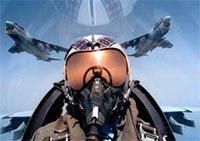 o you envy the life of The Aviator?
o you envy the life of The Aviator?
Have you often dreamed of soaring like a bird?
Then a career in aviation might just be your calling. But, before looking at the enrollment form, you need to have a reality check.
 Do you handle emergencies well?
Do you handle emergencies well?
Are you physically fit?
Are you ready to put in long hours in a job that can be highly stressful?
Can you stay awake for hours at a stretch?
Do you have an analytical and logical mind?
Are you good at Maths and Physics?
If yes, read on!
Job profile: Behind the glitz
Essentially, a pilot's job is to fly an airliner, for long or short hauls. But besides this, you also have additional duties as follows.
i. Preparatory duties, like checking pre-flight plans before take off, are a pilot's responsibilities.
ii. Pilots have to check the route that the aircraft would fly and meteorological information.
iii. Calculation of fuel requirements are also part and parcel of any pilot's duties.
iv. In flight, pilots must interpret data flowing from their instrument panel and stay in touch with air traffic control and the cabin crew.
v. Post flight, pilots draw up a flight report, mentioning any equipment problems or general difficulties.
The highs and lows of being a pilot
~ The highs
What's the most intriguing thing about being a pilot?
A pilot with Indian Airlines, Bangalore, says, "The exhilaration you experience while being airborne has no substitute. Man isn't meant to fly. So when you do, it is really exciting. I find the precision involved in landing very challenging."
Besides getting high salaries, pilots also get additional allowances for overseas flights and long hauls.
Certain other perks come with a career in aviation. For instance, you are entitled to airline tickets for your family.
Also, pilots are allowed many holidays and the hours of work are limited.
~ The lows
Of course, going against the gravitational pull of nature is fraught with perils.
Flying against bad weather, a hectic schedule, high stress and sometimes letting go of weekly offs is part of a career in aviation.
These days, the threat of hijacks and terrorist attacks has also made the job risky.
You must adhere to rules and regulations. There is no allowance for any error. After all, the lives of a number of passengers depend on the pilot!
The training for a commercial pilot is expensive. So if the costs and the efforts involved don't scare you, go for it.
After all, not everyone is lucky enough to have his/ her head in the clouds, literally!
The future of flying
"The aviation industry is on the brink of massive expansion," says Sheo Prakash, chief flight instructor of the Bombay Flying Club. He adds, "With foreign direct investment in the sector increasing and low entrepreneurs announcing new low cost carriers, a career in aviation may be the key to a bright future. Also, compared to other professions, this one is really exciting."
The Bombay Flying Club trained around 33 pilots last year. Many of them have gone on to obtain their commercial pilot's license and good jobs with reputed airlines.
Do you have it in you?
Sheo Prakash offers a few pointers on the qualities that pilots must have:
i. Grasping power. This is the most important quality an aspiring pilot requires. You must absorb what you learn quickly, and leave no room for errors.
ii. Skill. You will need to go through an intense training. And the quality that will make you stand out is your skill.
iii. High proficiency. The more the number of flights you take and the kinds of aircraft you fly, the better your proficiency.
Military or commercial pilot?
In India, you have the option of joining two sectors:
~ The commercial sector
i. You could fly a domestic or international passenger aircraft.
ii. You could fly a cargo aircraft.
iii. You could work for a corporate or a high net worth individual, who have their own aircrafts and require pilots to jet set around.
iv. You could be a helicopter pilot with a public or private sector corporate or work for a security agency.
~ The military sector
A military pilot flies airplanes belonging to the Indian Air Force, the Indian Army and the Indian Navy.
DON'T MISS!
- Part II: Train to be a commercial pilot!
- Part III: Train to be a military pilot!





